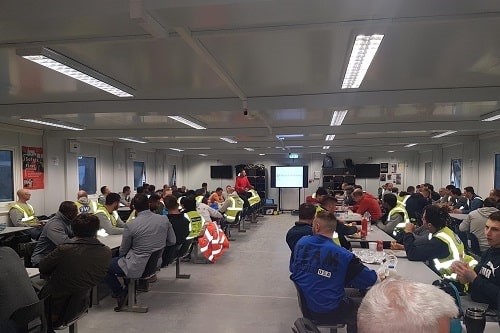Teaching stress management to an all-male audience of haulage and logistics workers can be a tough gig.
Features
Coaching Construction
When Julian Hall began his talk to a crowd of 100 drivers at a firm in Derbyshire, he hit a wall. “I asked them to give me an example of unhealthy stress. Deep silence. Then someone said: ‘getting a really bad b*** j**.’ They don’t feel safe to acknowledge weaknesses. They use banter to cover all that stuff up.”
Julian Hall is the managing director of Calm People, a consultancy which grew out of the school of anger management and which now focuses on tackling workplace conflict as a source of stress. He’s part of the new wave of coaches, consultants and workplace therapists who are offering some new ideas for the construction sector to use to manage stress and to promote wellbeing.
According to the Financial Times, US-style health coaching is “making inroads into UK companies…designed to reduce doctor visits and hospital admissions.” One psychologist interviewed for the FT Health at Work supplement in November says: “Health coaching is on the cusp of being a significant new trend in workplaces due to the changing nature of health needs.”
So, what are they offering and what services might be relevant to improving the health of construction workers?
Teaching healthy conflict
Promoting positive working to avoid conflict is one of the six areas HSE says to tackle to reduce workplace stress (Stress Management standards). Hall believes that conflict can’t be avoided, however: “Conflict is inherent in any workplace. For a team to be effective, they must have conflict.” In his workshops, he teaches what healthy conflict might look like, compared with ‘passive’ or ‘open aggression’, which are both unhealthy but common, and which can make working life miserable. “We talk about the different characteristics of each. One of the characteristics of healthy and assertive behaviour is that it’s brave. And we’re very clear that when you’re being passive aggressive or openly so, that’s a coward’s way out.”
 Workplace conflict is healthy but if boundaries are crossed it can escalate into bullying, says Julian Hall at Calm People
Workplace conflict is healthy but if boundaries are crossed it can escalate into bullying, says Julian Hall at Calm People
So, his work helps to tackle issues like bullying, as well as aggression, which is relevant to construction because the pressures of deadlines and long hours are both triggers for workers to lash out (one ex-builder tells us he recalls actual fights happening on site).
Workers are given tools to recognise when they feel conflict and then to express it in a clear and constructive way. “Having a team that are in healthy conflict means they can be really honest and direct with each other and respectful of others’ boundaries,” says Hall.
“They can then create an environment where even the most introverted and submissive member of the team feels safe enough to say, ‘that’s not right’.”
One company now sets aside a moment for ‘healthy conflict’ at the start of every team meeting. “They start it by having as many people who need to clear the air do so. The meeting after is more productive because people aren’t carrying unhelpful conflict into it.”
A deadline-based industry
Dr Reena Kotecha teaches mindfulness, among other techniques, in sectors like construction, incorporating her background in neuroscience and mental wellbeing into her work. She has also helped to introduce mindfulness to employees at The Broadway, a mixed-use development under construction in Westminster, where Multiplex is the main contractor.
 Construction workers at Multiplex were coached in the science as well as techniques of mindfulness
Construction workers at Multiplex were coached in the science as well as techniques of mindfulness
Senior office manager at Multiplex, Ashleigh Lang tells us: “We looked at mindfulness on this project as something different for working in construction, an extremely deadline-based, highly pressured industry.”
They already had a wellbeing strategy and Multiplex wanted to see how mindfulness coaching could work for the stress reduction part of this. “Mindfulness is very much about being aware of the now,” says Lang. “If you are more aware of the now then you are more aware of what is happening around you. It also helps with techniques for reduction of stress; the less stress people are under, the safer they work.”
Mindfulness talks with Dr Kotecha were open to 100 operatives; 50 attended and from the feedback, all said they found the talks informative and wanted to learn more. Some particularly liked how talks explained the scientific basis for mindfulness, one operative commenting that it “wasn’t just a crazy concept for people being carefree and lazy, it was a genuinely scientific process allowing you to train yourself into dealing with the stresses of life in a controlled way.”
Lang adds it has been vital to tailor talks to the audience: “In our industry, we need to appeal to the cynical, to the scientific side of it – rather than the fluffy.” Results were encouraging enough for the company to work with Dr Kotecha on eight-week workshops on mindfulness. These have been trialled by senior management and will be rolled out to operatives.
“They wanted to rip my head off”
But while health and stress management coaches can be brilliant for introducing fresh thinking, their status as an outsider can be challenging if the company hasn’t really committed to change.
This can breed distrust or suspicion – it’s not unusual for coaches to be heckled or laughed at as the first example illustrated – because if you’re sending workers for a stress awareness workshop, and yet contributing to their stress with unrealistic deadlines or poor welfare facilities, anything the coach will say will ring hollow.
This was especially apparent at a protest for London bus drivers last summer. Drivers had met to raise serious issues they said had not been tackled by their employers at TfL, such as excessive hours, lack of toilet facilities and technology-related stress. “And they think the answer to this is training on fatigue – give us a break!” went the refrain. Send in a coach without tackling the root problems in the workplace at your peril, is the message.
 Dave Lee breaks the stigma around mental ill health by encouraging workers to see it as a normal fact of life
Dave Lee breaks the stigma around mental ill health by encouraging workers to see it as a normal fact of life
Coaches can also fail if they don’t resonate with the audience, says Dave Lee, who runs a coaching company called Fundamental Life. Recalling a job for a demolition works in Woolwich, which had shut for three hours for him do a presentation, he says: “I went in there suited and booted and I quoted all the regulations, why we should be doing this, CITB this, health and safety that, and they wanted to rip my head off.”
He now lets his cheery personality shine through, and reduces the stigma around mental health by encouraging people to see it as a normal fact of life. When he asks people to put up their hands if they’ve suffered from mental health, he celebrates it: “I’ll say, well isn’t this amazing [that we all feel it].”
As a builder who’s suffered from mental ill health in the past, Lee’s most successful talks have been when he brought this aspect in. After the disastrous talk in Woolwich, he says: “I went back a week later in jeans and a T-shirt and I shared my experience and they were hugging me afterwards.”
Unregulated industry
A glaring issue with the coaching industry is that it’s unregulated.
There are currently no laws against anyone operating as a therapist, psychotherapist or a counsellor in the UK, as the BBC Radio 4 programme the Therapy Business, highlighted. “Many have set themselves up after completing cheap online courses and, as the NHS struggles to cope with demand, the private therapy business is booming,” it said.
Kate Bishop, a coach who works with small teams and leaders in companies to help them fulfil their potential, agrees: “I think that the International Coaching Federation, and the Association of Coaching have such a rigorous approach to training, and when coaches follow that, as I have done, then yes you’re getting a fantastic service. But I do think it is very easy for someone just create a website and say, yes I coach people.”
 There are currently no laws against anyone operating as a therapist, psychotherapist or a counsellor in the UK
There are currently no laws against anyone operating as a therapist, psychotherapist or a counsellor in the UK
The weight of responsibility is considerable. Often clients who need support for a mental health condition will come to Kate, but they have chosen coaching as a more socially acceptable form of help, especially men who are attracted by its problem-solving approach.
“Quite a few clients have said, ‘Well, I wouldn’t want to do counselling, but I can do coaching because that’s about planning and actions and moving forward’,” she says. Kate relies on her training and its code of ethics to know where to draw the boundaries, and when to signpost clients on if she thinks they need proper mental health support. “I think any coach who is really good at what they do will, if appropriate, ask a client before they start working with them: have you thought about other interventions?”
Coaching is only one approach to tackling some thorny issues the industry is starting to face.
It can be hard to know if you are making a difference. But beyond any measurable objectives, there is this heart-warming anecdote from Hall, who made some headway with those haulage workers up in Derbyshire.
“He recalls: “Each workshop was peppered with examples at breaktime of rather large burly men sidling up to me saying ‘I know I’m playing the clown, but that’s how I survive in here. But can I let you know that I’m listening.”
HSE Stress Management Standards at: www.hse.gov.uk/stress/standards
FEATURES

Turning sustainability compliance into business opportunity
By Alastair Loasby, Saffery LLP on 27 February 2026
Businesses that publicly demonstrate good sustainability performance can reap financial, reputational and other benefits, but it’s important to minimise the cost of any reporting on sustainability issues and to focus efforts on improving aspects of sustainability where the benefits outweigh the costs.

How to mitigate the hearing loss cost escalation tsunami
By Peter Wilson, Industrial Noise and Vibration Centre (INVC) on 06 February 2026
Employers need to adopt the latest and most effective noise risk evaluation and management measures, or face rapidly-rising compensation claims for noise-induced hearing loss at work.

Young drivers and work-related road risk: why employers must act now
By Simon Turner, Driving for Better Business on 06 February 2026
Young drivers have a higher risk of being involved in road collisions due to factors such as their inexperience, so when employing them to drive for work, it is vital they receive the right support to help them grow into safe professionals behind the wheel.



